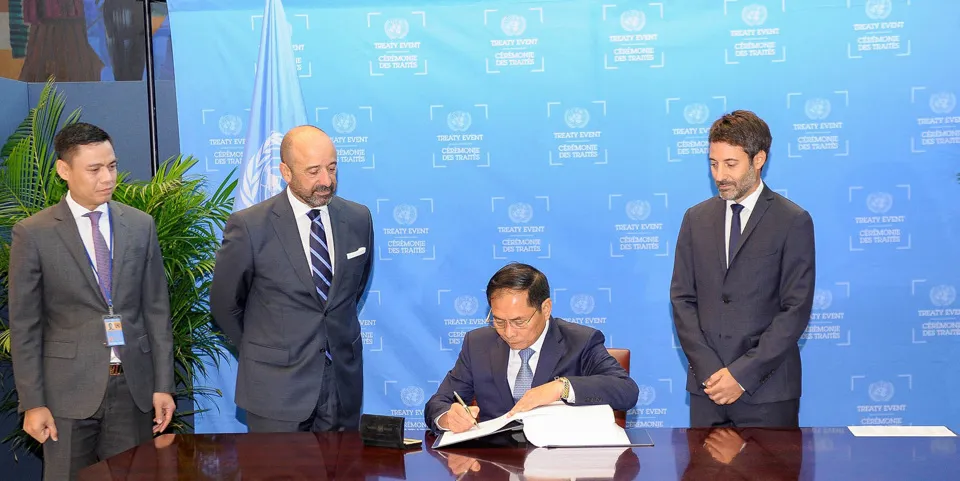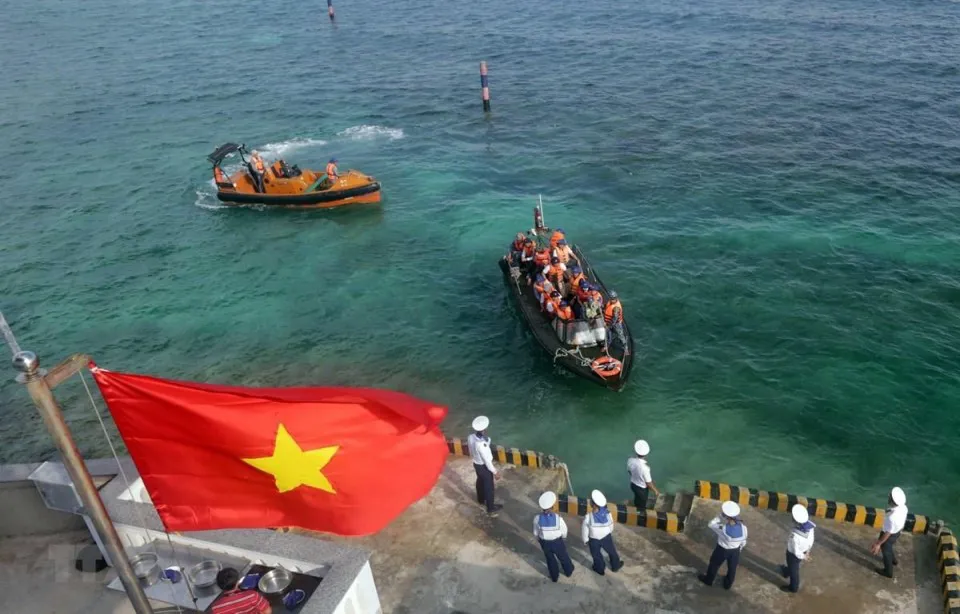Vietnam becomes one of first nations to sign High Seas Treaty
Signing the agreement signaled that Vietnam is an active and responsible member of the international community.
Vietnamese Foreign Minister Bui Thanh Son signed the United Nations Agreement on the Conservation and Sustainable Use of Marine Biological Diversity of Areas Beyond National Jurisdiction (The High Seas Treaty) on September 20, making Vietnam one of the first countries to join the internationally legally binding instrument under the 1982 United Nations Convention on the Law of the Sea (UNCLOS).
| Vietnamese Minister of Foreign Affairs Bui Thanh Son signs the United Nations' Treaty of the High Seas. Photo: VNA |
As part of Prime Minister Pham Minh Chinh's working trip to the United Nations General Assembly High-Level Week, the signing of the treaty conveyed the message that Vietnam is a positive and responsible member of the international community and that the country is committed to joining hands with countries to address global issues and contribute to peace, prosperity and sustainable development.
This is the third agreement negotiated and signed under the 1982 UNCLOS, reaffirming the role and importance of the Convention as the legal framework for all activities at sea and in the oceans.
Speaking to Vietnam News Agency correspondents in New York, Son said the signing of the treaty is an important milestone as it is the first document to comprehensively regulate the conservation and sustainable use of marine genetic resources in international waters.
At the same time, he noted, the international community's awareness and concern about marine issues and the law of the sea has increased in recent years, particularly in the context of the depletion of marine resources due to overexploitation and the adverse effects of pollution and climate change.
The signing of the treaty is the result of a long-term effort by the international community, a nearly two-decade process with formal negotiations beginning in 2018 and involving almost all UN member states, including landlocked countries or non-signatories of UNCLOS.
The minister said that the adoption of the treaty by consensus last June and the fact that a large number of participating countries signed it on the very first day demonstrated the success of the negotiation process, describing it as a historic milestone in the international community's efforts to protect the marine environment.
| Vietnamese Navy boats arrive at Da Lat Island in Truong Sa Archipelago. Photo: VNA |
The Agreement has opened opportunities for developing countries to access, participate in research and benefit from genetic resources in international waters while reaffirming the role and importance of the 1982 UNCLOS as the legal framework for all activities in the seas and oceans.
For Vietnam, the Agreement has many important meanings, the Minister said, stressing that it further strengthens the system of legal documents based on the 1982 UNCLOS in managing seas and oceans towards the goal of sustainable development. All maritime claims must not be detrimental to the common interests of the international community. The scope of international waters, where living marine resources belong to all mankind, should be determined through and following the 1982 UNCLOS, he stressed.
The agreement offers Vietnam and other developing countries the possibility to participate in scientific research and transfer of marine technologies and to receive economic benefits shared by other countries with greater advantages in marine technology and substantial scientific and technological resources to exploit genetic resources on the high seas.
It also establishes and promotes mechanisms for international cooperation and regional marine cooperation to conserve and share the benefits of marine genetic resources, providing Vietnam with the opportunity to encourage collaboration, strengthen the intertwining of interests, and contribute to the preventive protection of the homeland.
The High Seas Treaty regulates the utilization, benefit sharing, and conservation of marine genetic resources in international waters. This is a new potential resource in a large sea area, which accounts for more than 60% of the surface area of the oceans and does not belong to any country. Many areas on the ocean floor have exceptionally rich ecosystems with rare and precious genes of high value for scientific research and great economic potential, especially in pharmaceutical and cosmetic production.
More than 60 countries are expected to sign the treaty during the current high-level week of the 78th UN General Assembly.













